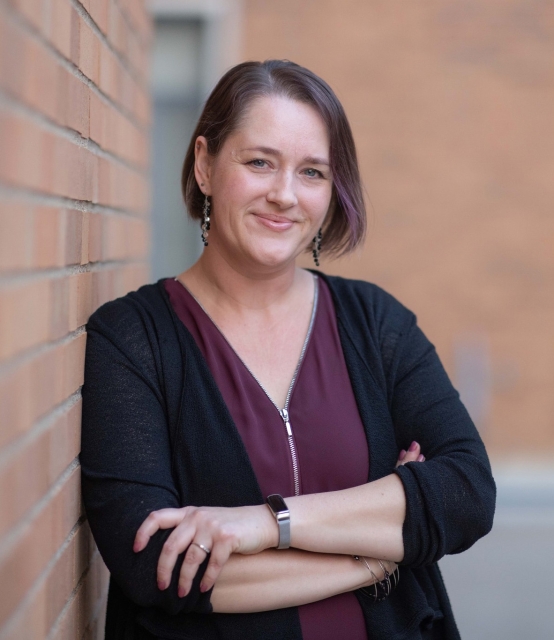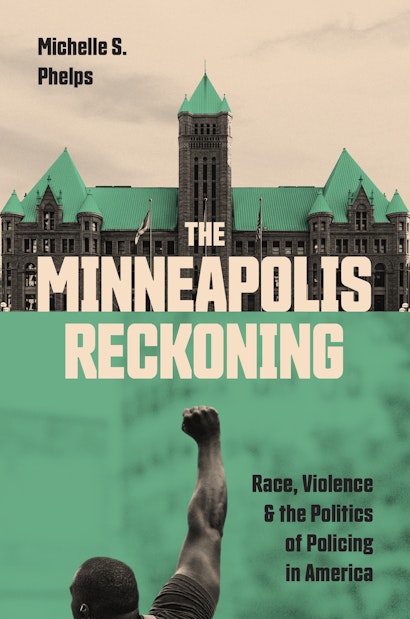The murder of George Perry Floyd Jr. in May 2020 by Minneapolis Police Department (MPD) officers has become one of the defining moments of the Black Lives Matter era, sparking a massive wave of protest across the country and calls to “end” the MPD. Drawing on years of fieldwork, The Minneapolis Reckoning describes how Minneapolis arrived at the brink of police abolition and what happened next. In this essential history of the MPD and the consequences of Floyd’s murder, Michelle S. Phelps documents the contested politics of policing and why it’s proved so difficult to end police violence.
Let’s start at the beginning: Why is the book titled “The Minneapolis Reckoning”?
MSP: I came to that title relatively late in the research process. The initial title for the project, which I began in 2017, was “Policing the Progressive City,” a nod to Minneapolis’ reputation for left-leaning politics. What I had hoped to convey with that title was that the book would probe the limits of what might be described as “progressive policing.” In a city where residents and elected officials alike promised to “listen to Black voices,” how might policing shift during the early years of Black Lives Matter mobilization? And would that look like justice?
Of course, by late 2020, Minneapolis had come to stand in the public imagination not as a vision for police reform, but as an emblem of public outrage and the failures of police reform. The enduring image of Minneapolis was not just a white officer’s seeming indifference to Black suffering, but of a police precinct building set on fire. The moment, as commentators across the country declared, was a racial reckoning. As my project and book shifted toward tracing the complicated aftermath of the murder and uprising, it became clear that the idea of this moment of reckoning and the place where it started should be a part of the title. (I wasn’t alone in making this choice; Deva Woodly’s Reckoning and John Hagan, Bill McCarthy, and Daniel Herda’s Chicago’s Reckoning are both excellent recent additions to scholarship on policing and racial justice.) It helped too that, unlike my first title, no readers would be confused about whether the book was set in the Progressive Era!
Looking back, it is clear that many of the promises of the summer of reckoning have failed to materialize, including the end of the MPD. Instead, we’ve seen a backlash against the limited gains of the defund movement as public attention shifted toward community (rather than police) violence. But that, too, is its own kind of racial reckoning—remember, reckoning means either a process of calculating the sum owed or a settling of accounts. Perhaps its fairest to say that while the country has started the work of accounting for racism (in fits and starts, with periods of retrenchment), the debt is far from settled.
Why didn’t Minneapolis abolish the police?
MSP: There’s so much to unpack here, but let’s start with the actual proposal. The initiative that residents voted on in November 2021 would have struck out all the text on the MPD in the city’s charter (which mandated a police department exist with a minimum number of officers) and replaced it with a required Department of Public Safety oriented around a holistic public health approach (which could, if necessary, include law enforcement).
While media headlines framed this initiative as a defunding or even abolitionist proposal, nothing on the ballot actually required such shifts. It was designed, instead, to change the political terrain around policing, making it possible for there to be dramatic changes in staffing types and levels. Implementation, however, would be determined by who controlled City Hall.
The ballot question won 44% of the vote, an impressive share given that it was associated with police abolition long after the heat of the summer 2020 protests had died down. But it was under the 51% threshold needed to win. Precinct-level voting patterns show that the neighborhoods in North Minneapolis with the largest share of Black residents voted “no,” on average. Its staunchest opposition, though, came from the city’s wealthiest and whitest Southwest corner. Support, in contrast, was strongest in the multi-racial neighborhoods around George Floyd Square and precincts with the largest number of young voters. Polling data collected the month before the result confirmed these trends, with few obvious racial divides, but big gaps across age categories. The most important demographic divide, in other words, was generational.
Research I conducted for the book helps to explain these trends, showing that many Black community members in low-income neighborhoods were unsure whether the charter amendment would lead to more safety for them, especially when the police were vocally opposed to the initiative and gun violence was ravaging their communities. It wasn’t that these neighborhood residents wanted more police, but that they wanted more protection—both from police and community violence. This tension animates my core conclusion: because police represent both the promise of state protection and the threat of state violence, often to the very same communities, efforts to challenge police power are inherently fraught.
So does that mean nothing changed in Minneapolis?
MSP: No! I think it’s a real mistake to interpret the charter amendment vote as the end or failure of efforts to reimagine public safety. Today, the MPD is better funded than ever before, but it is operating with a third fewer officers than in early 2020—it’s struggling to recruit and retain officers, and policies around hiring, training, and oversight are in flux as the department negotiates and implements consent decrees with both the Minnesota Department of Human Rights and the federal Department of Justice. Though it’s too early to say whether these interventions will ultimately succeed in changing the culture and practices of the MPD, it is clear that the process of seeking justice is still unfolding.
In the meantime, even though the charter amendment failed, novel approaches to public safety demanded by organizers have begun to take root and bloom in Minneapolis. These include a new unarmed behavioral crisis response program (the BCR, which now responds to more mental health crisis calls than the MPD), expanded community-based violence prevention efforts, and initiatives led by organizers to build community safety capacities outside of the state. My book traces these nascent alternatives, arguing that they are models for enacting new visions of community safety and challenging police power over city politics.
Michelle S. Phelps is associate professor of sociology at the University of Minnesota, Twin Cities. She is the coauthor of Breaking the Pendulum: The Long Struggle Over Criminal Justice. Her research has been featured in the Washington Post, The New Yorker, Time Magazine, NPR, FiveThirtyEight, The Appeal, and other media outlets, and has informed criminal justice reform efforts by the Human Rights Watch and Pew Charitable Trusts Public Safety Performance Project.

